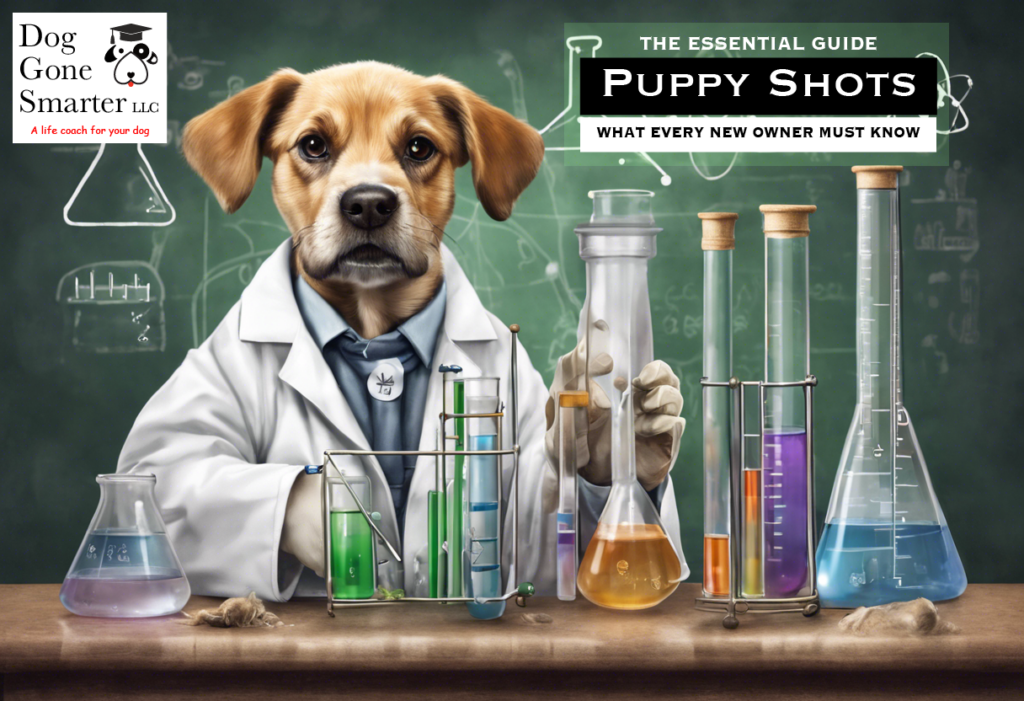Getting a new puppy is an exciting experience, but it also comes with a lot of responsibility. One of the most crucial aspects of being a responsible puppy owner is ensuring that your furry friend receives all the necessary vaccinations to protect them from various infectious diseases [1]. Vaccinations are essential for puppies to prevent dangerous and potentially deadly diseases, and they are crucial for your puppy’s health and the safety of those around it [1] [2].
In this comprehensive guide, we’ll cover everything you need to know about puppy shots, from the core and non-core vaccinations to the essential first-year puppy vaccination schedule. We’ll also discuss common side effects and how to handle them, the importance of booster shots, and keeping track of your puppy’s vaccine records. The American Kennel Club (AKC) and Autumn Trails Veterinary Center provide detailed information on puppy vaccinations, which we’ll explore throughout this article [1] [2].
Understanding the Basics: Vaccination Overview
Vaccinations are a crucial aspect of your puppy’s health care, protecting them from various infectious diseases that can be life-threatening [1]. Core vaccines, which are essential for all puppies, include Distemper, Canine Hepatitis, Canine Parvovirus, Canine Parainfluenza, and Rabies [1] [15]. These vaccines protect against common and severe diseases such as parvo, which causes bloody diarrhea, vomiting, dehydration, and low white blood cell counts, and distemper, a virus that can lead to neurologic disease and death [4] [7].
In addition to core vaccines, there are also non-core or optional vaccines that may be recommended based on your puppy’s lifestyle, geographic location, and risk of exposure [1] [6] [16]. These include:
- Bordetella Bronchiseptica (kennel cough) [1] [10]
- Leptospirosis [1] [10]
- Lyme Disease [1] [10]
- Canine Influenza (H3N2/H3N8) [1] [10]
- Coronavirus [17]
It’s important to note that vaccines are generally safe and do not cause any noticeable changes in your puppy’s behavior or overall health [3]. Modern vaccines are preservative-free, eliminating concerns about mercury or adjuvants [3]. Vigilance and high standards ensure that veterinary vaccines are safe and effective [5].
Core Vaccinations for Your Puppy
Core vaccinations are essential for all puppies, protecting them from life-threatening diseases such as Distemper, Canine Hepatitis, Parvovirus, and Rabies [1] [6] [8] [11] [12] [14]. The American Animal Hospital Association (AAHA) recommends these core vaccines for all dogs [13]. Puppies should start receiving their core vaccinations at 6-8 weeks of age [1] [4] [7] [8] [19].
A typical puppy vaccination schedule for core vaccines includes:
- 6-8 weeks old:
- 9-11 weeks old:
- 12-14 weeks old:
- 15-17 weeks old:
- 16-18 weeks old:
The DHPP vaccine, which protects against Distemper, Hepatitis, Parainfluenza, and Parvovirus, is given incrementally over a puppy shot schedule at 6-8 weeks, 10-12 weeks, 14-16 weeks, 18-20 weeks, and 1 year, then every 3 years [1] [6] [11]. The Rabies vaccine is administered at 16-18 weeks, then between 1-3 years old, and every 3 years thereafter [7] [11] [13]. A puppy is considered fully vaccinated when they have received their rabies vaccination and two rounds of the DHPP vaccine, given 2 to 4 weeks apart, with a booster when they are between 16 to 18 weeks old [7].
Non-Core Vaccinations: Tailoring to Your Puppy’s Needs
In addition to core vaccinations, your veterinarian may recommend non-core vaccines based on your puppy’s lifestyle, geographic location, and risk of exposure [1] [6] [10] [16]. These vaccines are tailored to protect your furry friend from specific diseases they may encounter in their environment or through social interactions [8] [9].
Some common non-core vaccines include:
- Bordetella Bronchiseptica (Kennel Cough): Recommended for social dogs that frequent dog parks, daycare, boarding facilities, grooming salons, or dog shows [8] [22]. This vaccine is typically administered every 6-12 months, depending on your dog’s exposure risk [15] [27].
- Leptospirosis: Recommended for dogs living in or traveling to areas where this bacterial disease is endemic [8] [23]. The vaccine is usually administered in two doses, 2-4 weeks apart, starting at 12 weeks of age, with annual boosters [6] [15] [28].
- Lyme Disease: An optional vaccine for dogs eight weeks or older in regions where Lyme disease is prevalent [15] [19] [24]. It is administered in two doses, 2-4 weeks apart [6].
- Canine Influenza (H3N2/H3N8): Recommended for dogs at risk of exposure to the canine flu, especially in social settings [6] [8] [25]. The vaccine is given in two doses, 2-4 weeks apart, around 6 months of age, followed by annual boosters [15] [29].
Other non-core vaccines that may be considered based on your puppy’s individual needs include:
- Canine Coronavirus [17]
- Canine Parainfluenza Virus [14] [26]
- Crotalus Atrox (Rattlesnake) Vaccine [26] [30]
Your veterinarian will assess your puppy’s unique requirements during their annual check-ups and recommend the appropriate non-core vaccines [6] [17]. While vaccination guidelines provide a general framework, they should be adapted to suit your puppy’s individual needs, taking into account factors such as local disease prevalence and evolving standards of care [6] [13] [14].
The Essential First-Year Puppy Vaccination Schedule
The essential first-year puppy vaccination schedule includes core and non-core vaccinations at specific intervals to protect your furry friend from various infectious diseases [1]. The first vaccination for puppies should be given at 6 to 8 weeks, with boosters every 2-4 weeks until 16-20 weeks old [8]. For dogs ≤16 weeks of age, at least 3 doses of a combination vaccine are required between 6 and 16 weeks, 2-4 weeks apart [6]. For dogs >16 weeks of age, 2 doses of a combination vaccine, 2-4 weeks apart, are necessary [6].
A typical puppy vaccination schedule looks like this:
- 6-8 Weeks:
- 10-12 Weeks:
- 14-16 Weeks:
The generally accepted puppy vaccination schedule also includes:
- 12-16 months: DHPP, rabies, and optional vaccinations [1]
- Every 1-2 years: DHPP and optional vaccinations [1]
- Every 1-3 years: Rabies (as required by law) [1]
It’s important to note that the Bordetella, Lyme, and Leptospirosis vaccines are administered based on geographic location and lifestyle risks [17]. A series of vaccinations ensures that at least two fall within the time frame when the puppy has lost immunity from its mother [17]. Your veterinarian will tailor the vaccination schedule to your puppy’s specific needs and risk factors [13].
Common Side Effects and How to Handle Them
While vaccinations are generally safe and protect your puppy from life-threatening diseases, it’s important to be aware of potential side effects and how to handle them. Common mild side effects include:
- Decreased physical activity [3]
- Slight swelling or discomfort at the injection site [3] [19]
- Sneezing or a mild cold for intranasal vaccines [3]
- Low-grade fever [19]
- Fatigue [19]
- Reluctance to eat or eating less than normal [19]
- A small bump at the site of injection [19]
These mild side effects usually subside within a day or two [19]. However, if your puppy experiences more severe symptoms, such as persistent vomiting, diarrhea, collapse or fainting, swelling of the muzzle, face, or eyes, rash or hives, or difficulty breathing, it may be a sign of a serious allergic reaction and requires immediate veterinary attention [3] [19].
In rare cases where a puppy experiences a severe reaction, veterinarians can provide alternative protection methods, such as individualized booster vaccines, anti-inflammatories, or observation during the next round of vaccines [3]. Treatment for severe cases typically involves medications such as antihistamines, steroids, IV fluids, and oxygen [19].
Booster Shots and Their Importance
Booster shots are crucial for maintaining immunity and preventing diseases in your furry friend [20]. The DHPP booster should be given every 1-2 years, while Rabies shots are typically administered every 1-3 years [1]. Rabies vaccination is usually required by law at 3-6 months of age, with a booster 12 months later, followed by a booster every 1-3 years [8].
Although not all vaccines require annual boosters, abstaining from them can put your dog at risk [5]. Blood tests to measure antibody titers can determine if boosters are necessary, but they may be more expensive and stressful than revaccination [5]. The frequency of vaccination depends on your dog’s lifestyle and relative risk [5]. For low-risk dogs or those with owners who prefer less frequent vaccination, core or essential viral vaccines may be given on a three-year schedule [5]. Some viral vaccines may convey at least three years of immunity, but bacterial vaccines usually require annual boosters [5].
It’s essential to keep track of these vaccinations and their subsequent booster shots in your puppy’s vaccination record [21]. Veterinarians can verify the accuracy of past entries, provide guidance on future vaccinations, and tailor the vaccination schedule based on your puppy’s health, breed, and lifestyle [21]. Adult dogs also require booster shots and titers to ensure their immunity levels are sufficient [1].
Keeping Track and Staying Updated: Vaccine Records and Booster Shots
Keeping track of your puppy’s vaccine records and staying updated on booster shots is crucial for their health and well-being [20]. Here are some essential tips to help you stay organized and informed:
- Start a Puppy Vaccination Record:
- Begin recording your puppy’s vaccinations as soon as they receive their first shot [21].
- Include detailed information about each vaccine, such as the date administered, name and type of vaccine, dosage, and veterinarian’s signature or stamp [21].
- This record is a legal document in many places, required for puppy training classes, boarding, grooming, and even some public dog areas [21].
- Use a Dog Vaccination Record Book:
- A log book helps pet owners keep track of their dog’s health information, including vaccinations, vet visits, medications, and other important details [22].
- Look for a book with room for recording veterinary visit details, a vaccination schedule guide, a page for attaching your dog’s picture, and ample pages with thick, high-quality interior paper [22].
- This book serves as a valuable resource for dog owners, groomers, and dog sitters [22].
- Consider Digital Solutions:
- Digital vaccination records, such as My Rover, offer convenience and ease of use [21] [23].
- Features may include automatic reminders for upcoming shots, easy sharing with veterinarians, and integration with other pet health management tools [21].
- My Rover, created by vets for vets, aims to make life easier for pet owners and serves as a central vaccination record that can be used at pet shops, shelters, boarding facilities, and MPI [23].
Remember to update your puppy’s record immediately after each vet visit and store it in a safe, easily accessible place [21]. The record is useful in emergency situations or if you change veterinarians, as it provides a quick reference to your puppy’s medical history [21]. It’s also necessary when traveling with your puppy or relocating [21].
In addition to keeping accurate records, it’s important to stay informed about your puppy’s booster shot schedule and any additional vaccinations they may need based on their lifestyle and risk factors [5] [14]:
- Heartworm preventative medication should be started around 12-16 weeks [1].
- Young dogs, small-dog breeds, and certain breeds like Boxers, Dachshunds, Pugs, Boston Terriers, Miniature Pinschers, and Chihuahuas are at a higher risk for adverse reactions to vaccines [19].
- The potential for vaccine reaction may be increased if a dog is given more than one vaccine per office visit [19].
- Some vaccines, especially those for infectious bacterial diseases, may be needed annually for dogs that are regularly boarded or exposed to other dogs [5].
Adult Dog Vaccination Schedule
| Annually | Every 3 Years |
| Rabies | Rabies (after initial vaccine) |
| Leptospirosis | DAP |
| Lyme | |
| Canine Influenza | |
| Bordatella (sometimes given every 6 months) |
Regular veterinary examinations are essential for all dogs, particularly senior dogs, as they can lead to early detection and treatment of infections, sub-clinical diseases, and organ dysfunction [5]. Vaccination decisions should be based on your dog’s lifestyle, age, and health status [5].
Conclusion
In conclusion, providing your puppy with the necessary vaccinations is a crucial aspect of responsible pet ownership. By understanding the core and non-core vaccines, following the recommended vaccination schedule, and staying informed about potential side effects and booster shots, you can ensure your furry friend remains healthy and protected from various infectious diseases. Keeping accurate records of your puppy’s vaccinations and staying updated on their booster shot schedule is equally important for their long-term well-being.
As a new puppy owner, it’s essential to work closely with your veterinarian to create a personalized vaccination plan that takes into account your puppy’s unique needs, lifestyle, and risk factors. By staying proactive and committed to your puppy’s health, you can help them grow into a happy, healthy adult dog that brings joy and companionship to your life for years to come.
References
[1] – https://www.akc.org/expert-advice/health/puppy-shots-complete-guide/
[2] – https://autumntrailsvet.com/puppy-vaccinations/
[3] – https://www.rover.com/blog/puppy-vaccine-reactions/
[4] – https://wardanimalhospital.com/the-importance-of-puppy-vaccinations/
[5] – https://vcahospitals.com/know-your-pet/vaccination-are-booster-vaccines-necessary-for-dogs
[6] – https://www.aaha.org/aaha-guidelines/2022-aaha-canine-vaccination-guidelines/recommendations-for-core-and-noncore-canine-vaccines/
[7] – https://www.goodrx.com/pet-health/dog/puppy-vaccine-schedule
[8] – https://www.petsmart.com/learning-center/dog-care/puppy-vaccinations-when-to-get-them-and-why/A0067.html
[9] – https://www.preventivevet.com/dogs/puppy-vaccine-schedule
[10] – https://www.petmd.com/dog/care/dog-vaccinations-for-every-lifestage
[11] – https://www.pawlicy.com/blog/puppy-vaccine-schedule/
[12] – https://www.thesprucepets.com/vaccines-for-dogs-3384664
[13] – https://www.pumpkin.care/blog/puppy-vaccine-schedule/
[14] – https://www.thezebra.com/resources/personal-finance/dog-vaccination-schedule/
[15] – https://www.salishvet.com/services/dogs/blog/what-are-core-and-non-core-vaccines-dogs-your-faqs-answered-national-pet
[16] – https://healthtopics.vetmed.ucdavis.edu/health-topics/feline/vaccination-guidelines-dogs-and-cats
[17] – https://vcahospitals.com/know-your-pet/puppy—recommendations-for-new-owners-part-i—veterinary-care
[18] – https://www.thesprucepets.com/puppy-vaccine-schedule-2804982
[19] – https://www.petmd.com/dog/general-health/possible-vaccine-reactions-in-dogs
[20] – https://money.com/puppy-vaccine-schedule/
[21] – https://peeva.co/blog/puppy-shot-record/
[22] – https://www.amazon.com/Dog-Vaccination-Record-Book-Immunization/dp/B08L7G9JWD
[23] – http://www.myrover.co/


